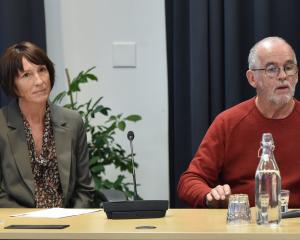The issuing of a stadium investment bond to allow Otago investors a chance to support the building of the new Forsyth Barr Stadium would have made sense, financial industry insiders say.
Criticism has been levelled at the Dunedin City Council for approaching a reasonably exclusive group of "habitual investors", when some local authorities go to the public and institutions for their funding requirements.
Insiders say the council missed the opportunity to encourage widespread financial participation in the stadium and promote an air of inclusiveness rather than the bitter debates that divided the city.
The stadium bond would have been popular throughout the South Island, and at 6.4% it was an attractive interest rate.
Doing that, though, adds to the costs of the interest rate needed to be paid to investors.
The plus side would be that the bonds would be traded on the debt market.
The $75 million raised by Dunedin City Treasury to help pay for the stadium cost the council a 6.4% coupon rate.
If it had been raised from mum and dad investors, the interest rate cost to the council would have been about 6.9%.
Those bonds, like others issued by the Dunedin City Treasury, are tightly held and none were being traded this week.
Sometimes, the bonds are traded on an unofficial "grey market".
Conversely, offering the public something like a stadium bond would have been a risk because it was believed not many Dunedin investors would have taken it up.
The minimum investment would have been about $10,000 and that would have appealed to only a minority of investors.
The Dunedin City Treasury's primary aim is to secure the best interest rate for ratepayers - getting the best price they can.
In the end, the Treasury does not make the decision on how much debt the council has.
That is the decision of the mayor, council and chief executive.
One of the worries for the treasury will be the amount of attention council members, including newly-elected Mayor Dave Cull, have drawn to the amount of debt being carried by the council.
The interest rate the council has to pay is almost solely based on the rating it receives from ratings agency Standard & Poor's.
S&P's will be aware of the claims of escalating debt and may be considering re-rating the council down from its A- status.
If that does happen, it will cost the council, and ratepayers, more to fund the debt as it will be seen as a riskier investment.
The DCC, along with other local authorities nationwide, does not rely solely on rates to fund its operations and often uses the bond market to secure short and long-term funding.
The money raised by bonds goes alongside bank debt and reflects the financing needs of the council at the time.
There is about $4.5 billion of local government debt in New Zealand, with predictions that will rise to about $10 billion within the next 10 years.
The Dunedin City Treasury report for the year ended June showed borrowings of more than $490 million, up from $368.5 million in the previous corresponding period.
Nearly $96 million of the debt will need to be refinanced in April next year.
That debt was issued in 2008 at a coupon rate of 8.7%, reflecting where interest rates were at that time.
Interest rates being paid by the treasury to its investors range between 8.7% on the $96 million to 5.555% on a $40 million investment maturing in June 2013.
During the recent local body election campaign, and again since the result was announced, there have been calls for the DCC to remove the secrecy around who buys the bonds.
It appears the DCC Treasury turns often to "habitual investors" to buy its bonds, removing the need to produce a prospectus or an investment statement.
The names of investors will not be revealed.
A habitual investor is someone whose principal business is the investment of money.
If the purchaser of bonds is identified as a habitual investor, an exemption is available to the Securities Act 1978 for the issuers of bonds.
Two other categories qualify for exemptions.
They are: wealthy investors and experienced investors.
A person is wealthy if an independent chartered accountant certifies, no more than 12 months before the offer is made, the person has net assets of at least $2 million and had an annual gross income of at least $200,000 for each of the previous two financial years.
A person is experienced in investing money if an independent financial service provider is satisfied the person understands the merits of the offer, the value of the security and the risks involved in accepting the offer.
Insiders say the DCC Treasury staff are totally focused on keeping the council's interest rates as low as possible.
Issuing a prospectus and an investment statement can add about 0.5% to the coupon rate being offered.
While a stadium bond would have been a good public relations move, the increased cost to the funding would have led to the decision to just issue the bonds to habitual investors.
That appears unlikely to change even with the election of a new mayor and council.
Favoured investors
Habitual investor: A habitual investor is someone whose principal business is the investment of money.
Wealthy investor: A person is a wealthy investor if an independent chartered account certifies, no more than 12 months before the offer is made, the person has net assets of at least $2 million and had an annual gross income of at least $200,000 for each of the last two financial years.
Experienced investor: A person is experienced in investing money if an independent financial service provider is satisfied the person understands the merits of the offer, the value of the security and the risks involved in accepting the offer.












